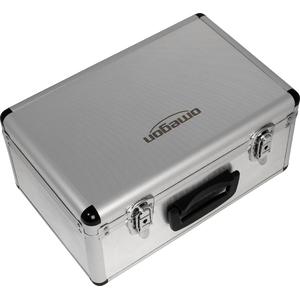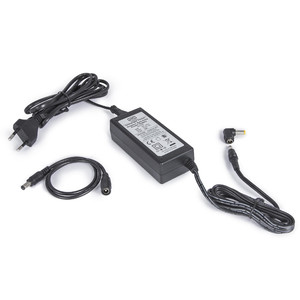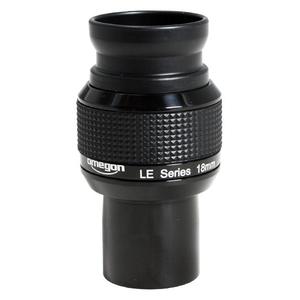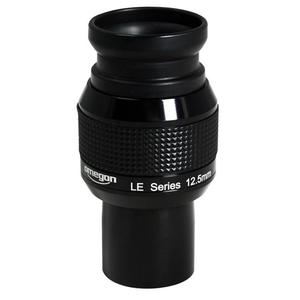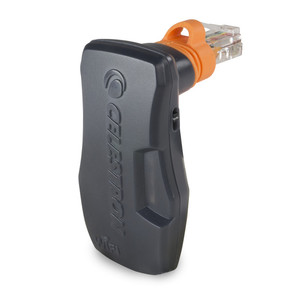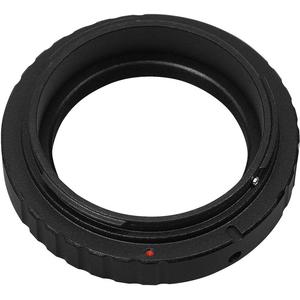The Schmidt-Cassegrain optics by Celestron:
Despite the long focal length of these telescopes, the OTA itself has a very short length, making the system a compact telescope which is extremely easy to transport. Light first hits an aspherically figured Schmidt corrector plate and is then thrown onto a spherical main mirror. This reflects the light back up, throwing it onto a secondary mirror which subsequently throws it back in the direction of main mirror. The light then passes through a central hole in the main mirror and into the focuser at the bottom of the OTA. Thus the system is closed and hence does not suffer from air turbulence which could degrade the image. Of course this also means that the system is optimally protected from dust. The Schmidt plate is multi-coated, ensuring bright images which do not suffer from stray light reflections.
This telescope provides a very good image, boasting high contrast and definition and provides a lot of pleasure when planetary observing. The Schmidt-Cassegrain design provides a good all-round system suitable for both observing and astrophotography and with an enormous range of optional accessories available. Using the bottom end of the OTA to look through means easy orientation. The system is also optimal for occasional terrestrial observing, e.g. birdwatching at close range. Celestron SC telescopes have an aperture ratio of around 1:10 which, so astrophotography is also very easily possible.
Main mirror focusing means a very large range of focus is made available, which allows virtually any common accessory to be used. Two pre-loaded ball bearings are used in the main mirror focus positioning mechanism in order to prevent 'mirror shift' - a typical problem when using simple bushings. The use of high quality materials such as CNC-milled aluminium components, cast steel and stainless steel guarantees extreme robustness with low weight. This means that a very heavy mount is unnecessary, not always the case for other telescope designs.
Features of the optics:
- long focal length with short OTA
- low weight aluminium OTA
- high quality XLT multi-coating
- closed system
- pre-loaded ball bearings for low mirror shift main mirror focusing
The Celestron CPC mount: The Schmidt Cassegrain scopes in the CPC series are securely mounted in a sturdy, cast aluminium fork mount. This means the telescope tube cannot be changed. However, this disadvantage is counteracted by their compact size, lack of need for heavy counterweights and excellent transportability. Yet, its greatest advantage is its unbelievably fast set-up and alignment. You are ready for observing within a few minutes - whilst others are still tightening screws and carrying out alignment. Simply set the tripod up at the desired height for either sitting or standing observation, level it using the built-in spirit level, fit the fork mount (sits in the middle), secure using the three spring-loaded screws - and switch on.
SkyAlign: The 16-channel GPS receiver sends satellite information about local time, date and coordinates to the electronic system. For initialisation (also known as alignment), the telescope needs to be pointed towards three bright objects in the sky in turn. These could be the Moon, bright planets or bright stars. You do not need to know what objects they are. This is a huge advantage at dawn!
After the third object, the telescope calculates a precise model of what it is seeing relative to the night sky. To achieve this, the electronic system carries out up to 120,000 comparative operations within a few seconds comparing the angles between the three objects against the planetarium catalog stored on the on-board computer. This extremely simple initialisation process for the GoTo controls has been named SkyAlign by Celestron.
Following alignment, over 40,000 database objects are instantly locatable. Up to 100 objects can be saved within the controls, including current comets for example.
The controls not only navigate to selected objects, but also provide recommendations depending on the night and current time. Information on numerous objects is also displayed on the ticker on the remote control’s display.
Furthermore, when the CPC telescope is placed on the optional equatorial wedge, another Celestron technology becomes available in addition to SkyAlign. Thanks to the All-Star Polar Alignment, you do not need a polarscope or view of the Pole Star to align the telescope.
The CPC mount properties at a glance:
- Drive and mechanism for quiet operation, with large gears and quick-lock coupling
- Autoguider and PC connections
- Secure self-centring on tripod.
- SkyAlign technology: Simply select three celestial objects and the telescope will tell you what they are.
- Comfortable mount for remote control: Information visible in display so hands remain free for working with optical accessories.
- Database featuring over 40000 celestial objects.
- The remote control software and motor control unit can be updated via the internet using Flash technology.
- Easy-to-find large coupling knobs on both axes for manual operation.
- Quick-release, spring-loaded solid metal finderscope mount with easy-to-operate x-y alignment.
- Tracking base with extra-large 25cm shelf provides quiet, stable tracking for telescopes of all sizes.
- Ergonomic design: The telescope can be comfortably transported from place to place.
- Permanent periodic error correction (PEC) with optional equatorial wedge for perfect astrophotos.
An important feature of the CPC telescope is its high-load-bearing tripod with stainless steel legs and cast aluminium accessory shelf/tripod spreader for high stability, with spring-loaded mounting screws and central locking device for quick set-up, height-adjustable for standing or sitting observations.
It not only matters which telescope you buy but also where you buy it. Our additional services:
- We are a leading telescope dealer and know the devices we sell. Our customer service team will gladly help you after your purchase if you have problems with assembly or operation.
- We provide a copy of the 80-page "Telescope ABC" beginners handbook with every telescope.
